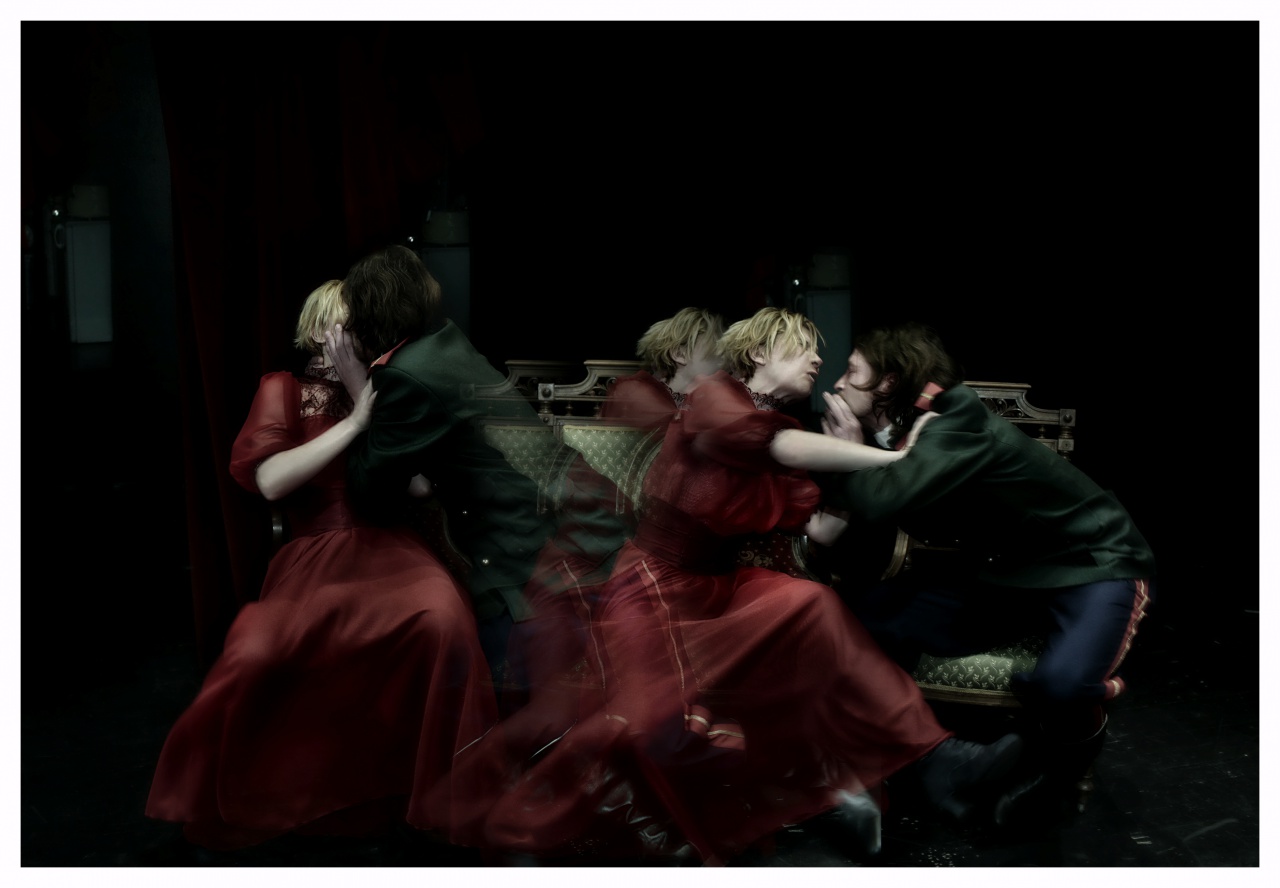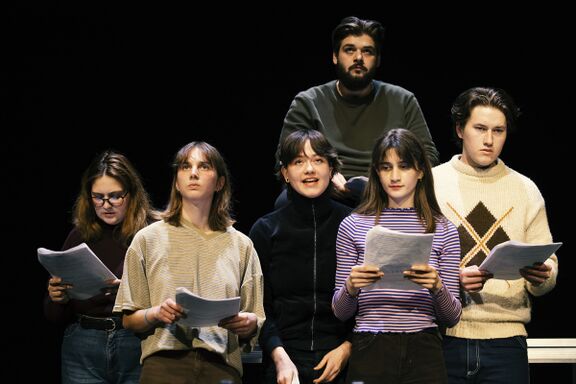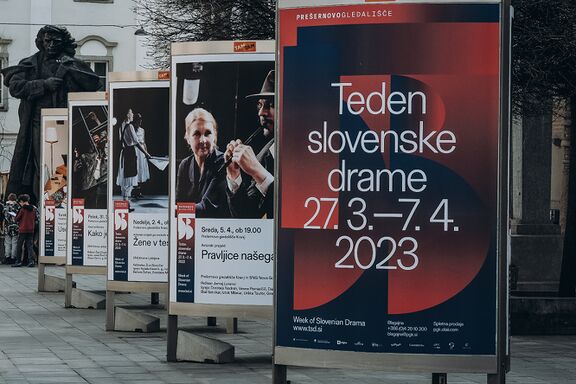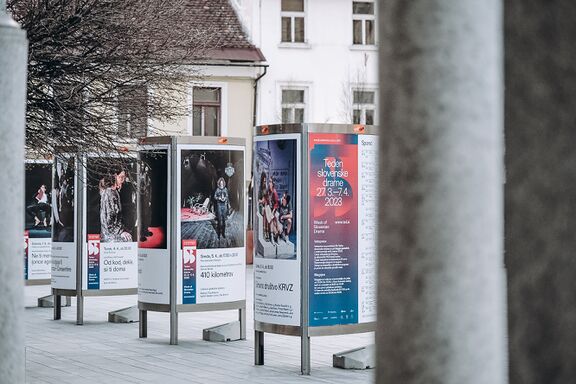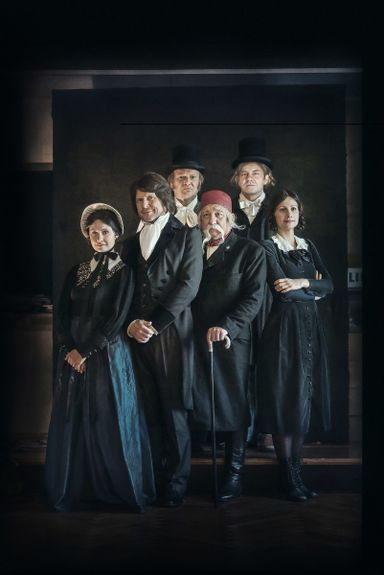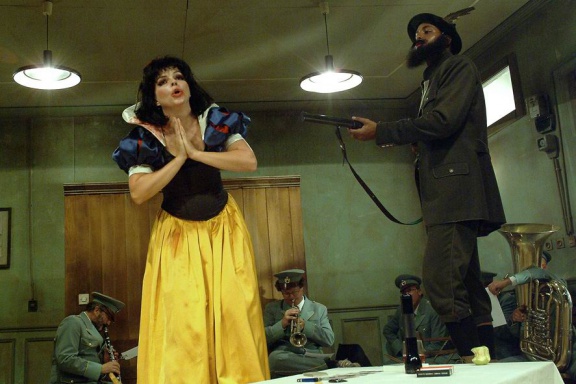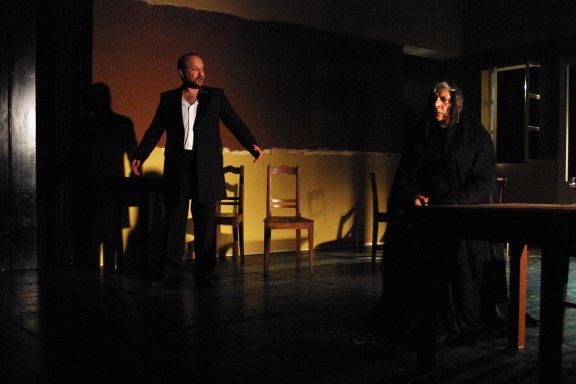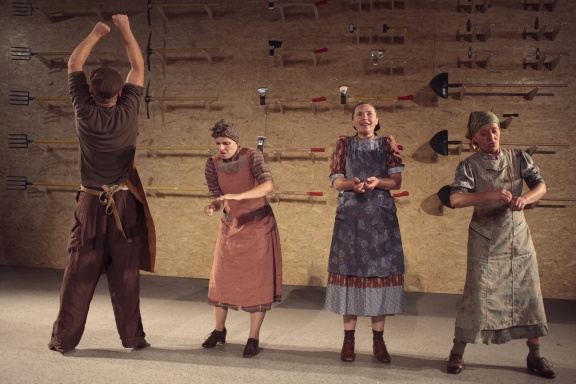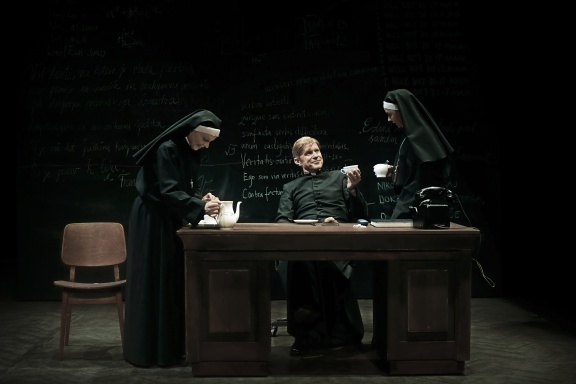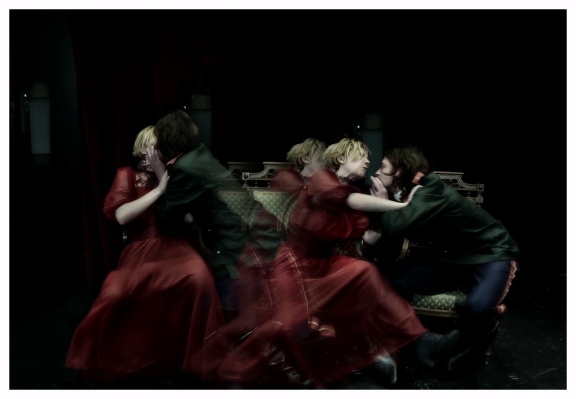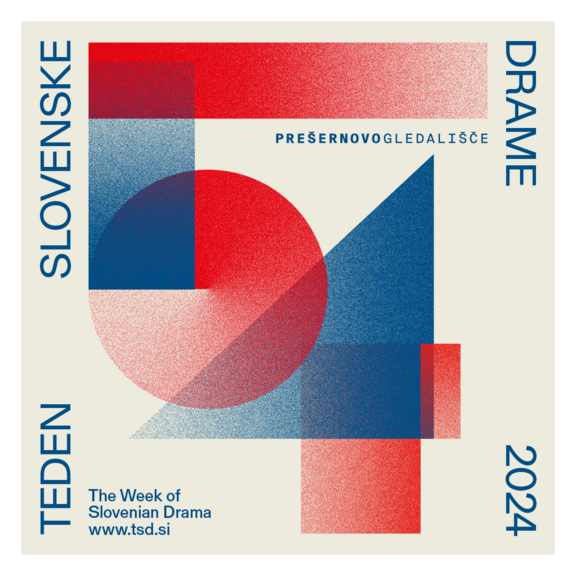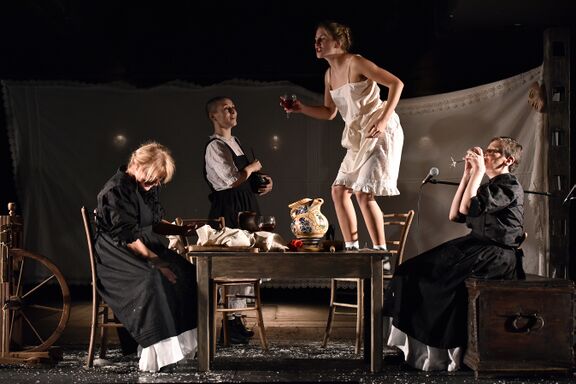Difference between revisions of "Prešeren Theatre Kranj"
(mwtool_article) |
|||
| (32 intermediate revisions by 6 users not shown) | |||
| Line 1: | Line 1: | ||
{{Article | {{Article | ||
| − | | status = TOPROOFREAD NIFERTIK! | + | | status = NEEDSUPDATE WRITING INFOBOX TOPROOFREAD NIFERTIK! |
| maintainer = Katja Kosi | | maintainer = Katja Kosi | ||
}} | }} | ||
| Line 9: | Line 9: | ||
| street = Glavni trg 6 | | street = Glavni trg 6 | ||
| town = SI-4000 Kranj | | town = SI-4000 Kranj | ||
| + | | map = http://www.openstreetmap.org/?lon=14.355878&lat=46.238049&zoom=18&layer=mapnik | ||
| telephone = 386 (0) 4 280 4900 | | telephone = 386 (0) 4 280 4900 | ||
| fax = 386 (0) 4 280 4910 | | fax = 386 (0) 4 280 4910 | ||
| email = pgk@pgk.si | | email = pgk@pgk.si | ||
| website = http://www.pgk.si | | website = http://www.pgk.si | ||
| − | | | + | | founded by = Municipality of Kranj |
| contacts = {{Contact | | contacts = {{Contact | ||
| − | | name = | + | | name = Mirjam Drnovšček |
| role = Director | | role = Director | ||
| − | | telephone = | + | | telephone = 386 (0) 4 280 4912 |
| − | | email = | + | | email = mirjam.drnovscek@pgk.si |
}}{{Contact | }}{{Contact | ||
| name = Marinka Poštrak | | name = Marinka Poštrak | ||
| Line 24: | Line 25: | ||
| telephone = 386 (0) 4 280 4916 | | telephone = 386 (0) 4 280 4916 | ||
| email = marinka.postrak@pgk.si | | email = marinka.postrak@pgk.si | ||
| − | |||
| − | |||
| − | |||
| − | |||
}} | }} | ||
| + | {{Contact | ||
| + | | name = Robert Kavčič | ||
| + | | role = Production Manager | ||
| + | | telephone = 386 (0) 4 280 4913 | ||
| + | | email = robert.kavcic@pgk.si | ||
| + | }} | ||
| + | | accounts = | ||
| + | http://www.facebook.com/presernovogledalisce.kranj | ||
| + | http://www.youtube.com/channel/UC2C2scGXzCpeIcUjF9r5ISw | ||
| + | https://twitter.com/presernovo | ||
}} | }} | ||
{{Teaser| | {{Teaser| | ||
| − | Prešeren Theatre was established as a professional theatre in [[established::1950]]. It is one of the smallest professional theatres in Slovenia, with a complete cast of only | + | |
| + | {{wide Image|Preseren Theatre Kranj 2012 Tri sestre.jpg}} | ||
| + | |||
| + | The [[Prešeren Theatre Kranj]] was established as a professional theatre in [[established::1950]]. It is one of the smallest professional theatres in Slovenia, with a complete cast of only 10 actors. Prešeren Theatre is a repertory theatre which stages around 4 premières per season, which are often awarded at Slovene theatre festivals. Since 1970 the theatre has organised the annual [[Week of Slovenian Drama]], a showcase of the most successful performances based on a Slovene play or text and staged in the last season by Slovene theatres. | ||
}} | }} | ||
| + | ==History== | ||
| + | During the first years of Prešeren Theatre's existence, it became known for experimental stagings, the introduction of modernist dramaturgical elements, and the first stagings of a number of drama texts, especially from the Anglo-Saxon area. The first Slovene staging of a text by Jean-Paul Sartre took place precisely in Prešeren Theatre Kranj, in December 1954. In the late 1950s, the political climate in Slovenia was not favourably disposed toward the theatre, which resulted in the theatre's suspension in the season 1957/58 and one of the biggest cultural scandals in the time of the communist regime in Slovenia. The theatre continued with its production as an amateur theatre until 1989. During this period, in 1971, it organised for the first time an overview of the stagings of Slovene dramatic texts, the now already firmly established annual festival – [[Week of Slovenian Drama]], which proved to be of extreme importance for the artistic renown of the theatre and the subsequent professionalisation of the theatre in 1989. | ||
| + | |||
| + | ==Programme== | ||
| + | In its repertory Prešeren Theatre Kranj aims to include the plays by most visible contemporary national and international authors and present the most ground-breaking and original contemporary works by following the world trends in playwriting. Thus, it has recently produced plays by authors such as Paula Vogel, Roland Schimmelpfennig, Mark Ravenhill, Elfriede Jelinek, Martin Crimp, and Jaan Tätte. It also produces comedy works, such as the highly successful stagings of [[Desa Muck|Desa Muck's]] best-selling youth novels ''Dead Serious About'' (Blazno resno ...), ''Partnership'' (Partnerski odnosi) (2008) by [[Tone Partljič]], ''Mr. Chance'' (Gospod Chance) (2008) by Jerzy Kosinski, etc. The theatre has also entered several Slovene co-productions, for example, with the [[Ex Ponto International Festival]] in the performance ''Life in the Shadow of the Banana Plant'' (Življenje v senci bananovca) (2007) and with [[Anton Podbevšek Theatre]] in the 2010 performance ''The Bondsmen – Commented Edition'' (Hlapci - Komentirana izdaja) based on [[Ivan Cankar|Ivan Cankar's]] play and directed by [[Matjaž Berger]]. Prešeren Theatre Kranj also includes in its programme performances by other Slovene production houses, for example, [[Koper Theatre]], [[Glej Theatre]], [[Mini Theatre]], etc. | ||
| + | |||
| + | {{YouTube|fHDrPrpjCnc}} | ||
| − | == | + | ==Awards== |
| − | + | Prešeren Theatre Kranj and the members of its ensemble often receive prestigious awards at Slovene and international theatre festivals. In 2009, the performance ''Highway Crossing or a Tale of a Goldfish'' (Prečkanje avtoceste ali Zgodba o zlati ribici) (2008) was voted by the audience as the best performance at the [[Slovene Festival of Chamber Theatre (SKUP)]], the ensemble received the [[Little Golden Stick Awards|Little Golden Stick Award]] for acting achievement in the performance ''Cat the Slipper Cobbler'' (Muca Copatarica) (2009) at the 2009 [[Golden Stick Festival]] in Ljubljana, in 2008, [[Mateja Koležnik|Mateja Koležnik's]] performance ''Miss Julia'' (Gospodična Julija) (2008) received the [[SKUP Award]] for best performance and best direction, while the members of the ensemble have been awarded with the [[Sever Award]] ([[Primož Pirnat]] in 2009, [[Peter Musevski]] in 2007) and special mentions of the [[Slovenian Association of Dramatic Artists]] ([[Vesna Slapar]] in 2008). In 2001, the theatre was awarded the Grand Prix at the Golden Lion Festival in Umag, Croatia, for the staging of ''How I Learned to Drive'' (Kako sem se naučila voziti) (2001) by American author Paula Vogel, while the play ''Mayor’s Micka'' (Županova Micka) (2001), directed by [[Vito Taufer]], was voted the best performance at the [[Week of Slovenian Drama]] in 2002. | |
| − | == | + | ==Week of Slovenian Drama Festival== |
| − | Prešeren Theatre Kranj aims to | + | Prešeren Theatre Kranj also organises the annual [[Week of Slovenian Drama]], which presents the most successful Slovene plays staged at home and internationally. The theatre aims to further expand the international part of the festival by devising round-table conferences involving famous dramatists, theatre experts, producers and publishers, whilst also trying to present more foreign plays based on Slovene drama texts. The festival presents the [[Grum Award]] for best original Slovene play and the [[Grün-Filipič Award]] for excellence in dramaturgy, as well as the jury-selected [[Šeligo Award]] for the best performance of a Slovene play at the festival and the audience-voted Audience Award. |
| − | + | In 2014 the [[Šeligo Award]] for best performance went to the performance ''25.671'' about the Erased, directed by [[Oliver Frljić]], created by the Prešeren Theatre Kranj ensemble. | |
| − | + | {{YouTube|yVUmDH0bx7Y}} | |
| − | |||
== Venues == | == Venues == | ||
| − | + | * '''type of venue''': theatre hall | |
| + | * '''main use:''' drama theatre performances | ||
| + | * '''seating:''' 253 seats total, comprising 192 stalls, 61 balcony | ||
| + | * '''proscenium opening:''' 11m W x 1.5m D x 10m H | ||
| + | * '''performing area:''' 10m W x 13m D x 8,5m H, flat wooden stage floor suitable for dance | ||
| + | * '''apron stage:''' 0.9m | ||
| + | * '''wing spaces:''' 1.5m W SR, 1.5m W SR | ||
| + | * '''suspension equipment:''' 13 electric lines, max load 150 kg | ||
| + | * '''soft hangings:''' black house curtain, black legs and borders | ||
| + | * '''lighting:''' 256-channel computer desk, extensive lighting rig including 20 profile 1000w, 46 PS 1000w, 20 PAR 1000 w | ||
| + | * '''sound:''' 36-channel mixer, 4+2 loudspeakers, 6 wireless microphones, 4 hand microphones; | ||
| + | * '''backstage:''' 4 dressing rooms accommodating 16 persons | ||
| + | * '''availability:''' available for hire | ||
| + | * '''technical staff:''' 4 technicians available | ||
==See also== | ==See also== | ||
* [[Slovene Drama Week]] | * [[Slovene Drama Week]] | ||
* [[Grum Award]] | * [[Grum Award]] | ||
| − | * [[Grün-Filipič | + | * [[Grün-Filipič Award]] |
| + | * [[Šeligo Award]] | ||
==External links== | ==External links== | ||
| − | * [http://www.pgk.si/ Prešeren Theatre Kranj website] | + | * [http://www.pgk.si/ Prešeren Theatre Kranj website] (in Slovenian, with some English) |
| + | * [http://www.theatre-architecture.eu/en/db/?theatreId=250 Prešeren Theatre Kranj architecture] – the history of the building from the ''Theatre Architecture in Central Europe'' web database | ||
| + | |||
| + | {{Gallery}} | ||
| + | |||
[[Category:Theatre]] | [[Category:Theatre]] | ||
[[Category:Theatre houses]] | [[Category:Theatre houses]] | ||
| − | [[Category:Theatre | + | [[Category:Theatre performances]] |
[[Category:Venues]] | [[Category:Venues]] | ||
[[Category:Theatre groups]] | [[Category:Theatre groups]] | ||
| + | [[Category:Festival organisers]] | ||
| + | [[Category:Theatre festival organisers]] | ||
| + | |||
| + | [[Category:EU funding of Slovene organisations (Culture and MEDIA Programmes)]] | ||
| + | [[Category:EU Culture funding recipient]] | ||
| + | [[Category:Municipal cultural institutions]] | ||
| + | [[Category:Theatre & Dance]] | ||
| + | [[Category:Theatre_festival_and_event_organisers]] | ||
Latest revision as of 02:41, 19 February 2021
-
13 Nov 2024
Austria Šmihel pri Pliberku - Sankt Michael ob Bleiburg Kulturno prosvetno društvo Šmihel - Kulturverein Šmihel
A performance of "Boj na požiralniku", a stage adaptation of the eponymous short story by Slovenian writer Prežihov Voranc, directed by Jernej Lorenci and produced by Prešeren Theatre Kranj and Ptuj City Theatre.
-
to
30 May 2024
31 May 2024
Two performances of "A Rainy Day in Gurlitsch", directed by Sebastijan Horvat and written by Milan Ramšak Marković. Produced by Prešeren Theatre Kranj and Ptuj City Theatre.
at the Sterijino Pozorje Festival
-
15 May 2024
"Our Warehouse - Naše skladišče", a humorous social drama directed by Mateja Kokol. Produced by Prešeren Theatre Kranj.
-
13 Apr 2024
A performance of "Muca Copatarica", a stage adaptation of a popular children's book about a slipper-mending cat by Ela Peroci. The play is appropriate for children aged 5 and above. Produced by Prešeren Theatre Kranj, directed by Katja Pegan and featuring another popular author Desa Muck in the titular role.
-
17 Mar 2024
A performance of "KONS: TO A NEW ERA - KONS: NOVI DOBI", a play by Žiga Divjak. Produced by Prešeren Theatre Kranj.
-
16 Dec 2023
A play inspired by a well known Slovenian children's tale, "Muca Copatarica", by Ela Peroci. Produced by Prešeren Theatre Kranj.
-
22 Nov 2023
"Škofjeloški pasijon - Škofja Loka Passion Play" - a spiritual performance by City Theatre Ptuj and Prešeren Theatre Kranj.
at the Desire Central Station
-
21 May 2023
-
26 Apr 2023
Austria Sankt Johann Im Rosental/Šentjanž v Rožu Kulturni in komunikacijski center:Šentjanž v Rožu
-
7 Mar 2020
The performance Reisefieber, produced by the Slovene People’s Theatre (SLG) Celje and Prešeren Theatre Kranj,
-
to
26 Oct 2019
27 Oct 2019
The Jewish Dog and The Carrot Dwarf, directed by Robert Waltl, both produced by Mini Theatre and co-produced by Prešeren Theatre Kranj and Jewish Cultural Centre Ljubljana,
-
13 Oct 2019
A Party for Boris, directed by Snežana Trišić and co-produced by Ptuj City Theatre and Prešeren Theatre Kranj,
at the Joakim InterFest
-
to
16 May 2019
20 May 2019
Bulgaria Vratsa
The dance performance Tobelia by Rosana Hribar and Nick Upper, produced by Dance Theatre Ljubljana, and the theatre performance The Jewish Dog, produced by Mini Theatre and co-produced by Prešeren Theatre Kranj and Jewish Cultural Centre Ljubljana,
at the National Festival of Small Theater Forms
-
to
24 Apr 2019
25 Apr 2019
Russia Saint Petersburg The Vasilyevsky Island Drama Theatre
The theatre performances Our Class, directed by Nina Rajić Kranjac, produced by Prešeren Theatre Kranj and co-produced by Mini Theatre and Ptuj City Theatre, and The Bedbug, directed by Jernej Lorenci and produced by the Prešeren Theatre Kranj and Ptuj City Theatre,
-
to
1 Nov 2018
3 Nov 2018
The multi-media performance art event Webbing by Eva Petrič and the theatre performance The Jewish Dog, produced by Mini Theatre and co-produced by Prešeren Theatre Kranj and Jewish Cultural Centre Ljubljana, supported by the Embassy of the Republic of Slovenia Washington,
at the United Solo Theatre Festival
-
7 Jul 2018
The performance A Grain of Salt or Happy Birthday, Marina, directed by Neda R. Bric and produced by Prešeren Theatre Kranj and National Theatre Tuzla,
at the Theatre Festival of Bosnia and Herzegovina
-
to
13 May 2018
14 May 2018
Dead Man Comes for His Sweetheart, directed by Jernej Lorenci and produced by the Prešeren Theatre Kranj and Ptuj City Theatre,
at the REFLEX
-
11 May 2018
The Jewish Dog, produced by Mini Theatre and co-produced by Prešeren Theatre Kranj and the Jewish Cultural Centre Ljubljana,
-
27 Apr 2018
Branislav Nušić's Bereaved Family, directed by Igor Vuk Torbica and co-produced by Prešeren Theatre Kranj and Slovene People’s Theatre (SLG) Celje,
-
18 Apr 2018
Austria St. Johann im Rosental/Šentjanž v Rožu
Helver's Night, directed by Alen Jelen and co-produced by the Prešeren Theatre Kranj and ŠKUC Theatre,
-
to
9 Apr 2018
10 Apr 2018
The Jewish Dog, produced by Mini Theatre and co-produced by Prešeren Theatre Kranj and Jewish Cultural Centre Ljubljana, supported by the Embassy of the Republic of Slovenia Tel Aviv,
-
to
19 Nov 2017
14 Dec 2017
The performance A Grain of Salt or Happy Birthday, Marina, directed by Neda R. Bric and produced by Prešeren Theatre Kranj and National Theatre Tuzla,
-
5 Jul 2017
Branislav Nušić's The Grieving Family, produced by the Prešeren Theatre Kranj and Slovene People’s Theatre (SLG) Celje
at the Theatre City Festival Budva
-
26 Jun 2017
Helver's Night, directed by Alen Jelen and produced by Škuc Theatre and Prešeren Theatre Kranj
at the Zlatni lav - Leone d'Oro, International Festival of Chamber Theatre
-
14 Jun 2017
Branislav Nušić's Bereaved Family, directed by Igor Vuk Torbica and coproduced by Prešeren Theatre Kranj and Slovene People's Theatre (SLG) Celje,
-
30 May 2017
The performance The Jewish Dog, co-produced by Mini Theatre, Prešeren Theatre Kranj and the Jewish Cultural Centre Ljubljana
at the Kolkata International Theatre Festival
-
to
22 Sep 2016
26 Sep 2016
Simona Semenič's We, European Corpses, produced by Mladinsko Theatre, and Svetlana Makarovič's Dead Man Comes for His Sweetheart, produced by the Prešeren Theatre Kranj and Ptuj City Theatre, at the 41st International Theatre Festival MOT
-
7 Jul 2016
Svetlana Makarovič's Dead Man Comes for His Sweetheart, produced by the Prešeren Theatre Kranj and Ptuj City Theatre,
at the Barski ljetopis Festival
-
26 May 2016
Svetlana Makarovič's Dead Man Comes for His Sweetheart, produced by the Prešeren Theatre Kranj and Ptuj City Theatre,
-
to
24 May 2016
29 May 2016
The Second Time, a solo performance by Simona Semenič, produced by Integrali Cultural Association and City of Women Association for Promotion of Women in Culture, and Svetlana Makarovič's Dead Man Comes for His Sweetheart, produced by the Prešeren Theatre Kranj and Ptuj City Theatre, at the TESZT - Euroregional Theatre Festival Timișoara, supported by the Embassy of the Republic of Slovenia Bucharest,
-
to
26 Feb 2016
4 Mar 2016
Lost Loves, produced by the Slovene People’s Theatre (SLG) Celje, and The President and Eve of Retirement, produced by the Prešeren Theatre Kranj, at the 12th Virovitica Theatre Meeting Virkas
-
to
17 Dec 2015
20 Dec 2015
Pretty Vida, co-produced by the Slovene National Theatre Nova Gorica, Slovene Permanent Theatre in Trieste and the Prešeren Theatre Kranj,
-
to
15 Dec 2015
16 Dec 2015
Pretty Vida, co-produced by the Slovene National Theatre Nova Gorica, Slovene Permanent Theatre in Trieste and the Prešeren Theatre Kranj,
-
25 Nov 2015
-
8 Oct 2015
Svetlana Makarovič's Dead Man Comes for His Sweetheart, produced by the Prešeren Theatre Kranj and Ptuj City Theatre,
-
14 Sep 2015
Ivo Svetina’s ABC oder Krieg, produced by the Muzeum Institute and co-produced by the Prešeren Theatre Kranj and Cankarjev dom opens the Vukov sabor 2015
-
to
29 Aug 2015
2 Sep 2015
Svetlana Makarovič's Dead Man Comes for His Sweetheart, produced by the Prešeren Theatre Kranj and Ptuj City Theatre, Tobelija, co-produced by B-51 Cultural Society, Cyril and Methodius, Who Are You?!, co-produced by New European Theatre Action (NETA), Hurrah, Nosferatu!, directed by Simona Semenič and produced by Slovene National Theatre Nova Gorica and Mladinsko Theatre, at the NETA 2015 International Theatre Festival
-
7 Jul 2015
Irena! or I can’t anymore, directed by Nick Upper (Niko Goršič), performed by Mirel Knez and co-produced by the Prešeren Theatre Kranj
at the International Theatre Festival Actor of Europe
-
to
29 Jun 2015
30 Jun 2015
Svetlana Makarovič's Dead Man Comes for His Sweetheart, produced by the Prešeren Theatre Kranj and Ptuj City Theatre, and Manipulations, produced by Via Negativa, at the 42nd International Festival of Alternative and New Theatre
-
22 Jun 2015
Ivo Svetina’s ABC oder Krieg, produced by the Muzeum Institute and co-produced by the Prešeren Theatre Kranj and Cankarjev dom at the Festival Grada Teatar
-
11 May 2015
-
21 Apr 2015
Svetlana Makarovič's Dead Man Comes for His Sweetheart, produced by the Prešeren Theatre Kranj and Ptuj City Theatre,
-
31 Jan 2015
Ivo Svetina’s ABC oder Krieg, produced by the Muzeum Institute and co-produced by the Prešeren Theatre Kranj and Cankarjev dom, supported by the Embassy of the Republic of Slovenia Belgrade,
-
to
27 Jan 2015
28 Jan 2015
-
24 Jun 2014
Svetlana Makarovič's Dead Man Comes for His Mistress, produced by the Prešeren Theatre Kranj and Ptuj City Theatre,
-
to
11 Jun 2014
14 Jun 2014
Boris, Milena, Radko, produced by the Slovene National Theatre Drama Ljubljana, and Dead Man Comes for His Mistress, produced by the Prešeren Theatre Kranj and Ptuj City Theatre, at the 38th Fadil Hadžić Days of Satire
-
to
28 May 2014
2 Jun 2014
Peter Handke's Storm Still, co-produced by the Slovene National Theatre Drama Ljubljana and Slovene Permanent Theatre in Trieste, and 25.671, produced by the Prešeren Theatre Kranj, at the 59th Sterijino Pozorje Festival
-
26 May 2014
-
7 May 2014
Marlene Dietrich, produced by the ŠKUC Association, Prešeren Theatre Kranj, and Imaginarni Institute,
-
11 Apr 2014
-
to
11 Apr 2014
16 Apr 2014
Little Luna and Big Luna, produced by Ljubljana Puppet Theatre and the Prešeren Theatre Kranj, at the 14th International Naj, naj, naj Festival
-
4 Mar 2014
Nebojša Pop - Tasić's Marlene Dietrich produced by the ŠKUC Association, Prešeren Theatre Kranj, and Imaginarni Institute
-
20 Feb 2014
-
9 Dec 2013
-
7 Dec 2013
-
17 Oct 2013
-
13 Oct 2013
25.671 produced by the Prešeren Theatre Kranj at the 8th International Theatre Festival JoakimInterFest
-
12 Oct 2013
-
11 Oct 2013
-
30 Sep 2013
-
25 Sep 2013
-
to
17 Jun 2013
19 Jun 2013
Marlene Dietrich, produced by the Prešeren Theatre Kranj, and The Forest Ends Here, by the Slovene National Theatre Maribor
at the Golden Lion International Festival of the Chamber Theatre
-
to
5 Jun 2013
17 Jun 2013
Christmas at the Ivanovs, produced by the Slovene National Theatre Drama Ljubljana, Women's Comedy, by Ljubljana City Theatre (MGL), 25.671, by the Prešeren Theatre Kranj, and Whore, by Glej Theatre
at the Fadil Hadžić Satire Days
-
18 May 2013
-
to
15 Apr 2013
17 Apr 2013
-
to
10 Feb 2013
24 Feb 2013
Three Sisters directed by Oliver Frljić and produced by the Prešeren Theatre Kranj and The Storm directed by Jernej Lorenci and produced by the Ljubljana City Theatre (MGL) at the Sarajevo Winter Festival
History
During the first years of Prešeren Theatre's existence, it became known for experimental stagings, the introduction of modernist dramaturgical elements, and the first stagings of a number of drama texts, especially from the Anglo-Saxon area. The first Slovene staging of a text by Jean-Paul Sartre took place precisely in Prešeren Theatre Kranj, in December 1954. In the late 1950s, the political climate in Slovenia was not favourably disposed toward the theatre, which resulted in the theatre's suspension in the season 1957/58 and one of the biggest cultural scandals in the time of the communist regime in Slovenia. The theatre continued with its production as an amateur theatre until 1989. During this period, in 1971, it organised for the first time an overview of the stagings of Slovene dramatic texts, the now already firmly established annual festival – Week of Slovenian Drama, which proved to be of extreme importance for the artistic renown of the theatre and the subsequent professionalisation of the theatre in 1989.
Programme
In its repertory Prešeren Theatre Kranj aims to include the plays by most visible contemporary national and international authors and present the most ground-breaking and original contemporary works by following the world trends in playwriting. Thus, it has recently produced plays by authors such as Paula Vogel, Roland Schimmelpfennig, Mark Ravenhill, Elfriede Jelinek, Martin Crimp, and Jaan Tätte. It also produces comedy works, such as the highly successful stagings of Desa Muck's best-selling youth novels Dead Serious About (Blazno resno ...), Partnership (Partnerski odnosi) (2008) by Tone Partljič, Mr. Chance (Gospod Chance) (2008) by Jerzy Kosinski, etc. The theatre has also entered several Slovene co-productions, for example, with the Ex Ponto International Festival in the performance Life in the Shadow of the Banana Plant (Življenje v senci bananovca) (2007) and with Anton Podbevšek Theatre in the 2010 performance The Bondsmen – Commented Edition (Hlapci - Komentirana izdaja) based on Ivan Cankar's play and directed by Matjaž Berger. Prešeren Theatre Kranj also includes in its programme performances by other Slovene production houses, for example, Koper Theatre, Glej Theatre, Mini Theatre, etc.
Awards
Prešeren Theatre Kranj and the members of its ensemble often receive prestigious awards at Slovene and international theatre festivals. In 2009, the performance Highway Crossing or a Tale of a Goldfish (Prečkanje avtoceste ali Zgodba o zlati ribici) (2008) was voted by the audience as the best performance at the Slovene Festival of Chamber Theatre (SKUP), the ensemble received the Little Golden Stick Award for acting achievement in the performance Cat the Slipper Cobbler (Muca Copatarica) (2009) at the 2009 Golden Stick Festival in Ljubljana, in 2008, Mateja Koležnik's performance Miss Julia (Gospodična Julija) (2008) received the SKUP Award for best performance and best direction, while the members of the ensemble have been awarded with the Sever Award (Primož Pirnat in 2009, Peter Musevski in 2007) and special mentions of the Slovenian Association of Dramatic Artists (Vesna Slapar in 2008). In 2001, the theatre was awarded the Grand Prix at the Golden Lion Festival in Umag, Croatia, for the staging of How I Learned to Drive (Kako sem se naučila voziti) (2001) by American author Paula Vogel, while the play Mayor’s Micka (Županova Micka) (2001), directed by Vito Taufer, was voted the best performance at the Week of Slovenian Drama in 2002.
Week of Slovenian Drama Festival
Prešeren Theatre Kranj also organises the annual Week of Slovenian Drama, which presents the most successful Slovene plays staged at home and internationally. The theatre aims to further expand the international part of the festival by devising round-table conferences involving famous dramatists, theatre experts, producers and publishers, whilst also trying to present more foreign plays based on Slovene drama texts. The festival presents the Grum Award for best original Slovene play and the Grün-Filipič Award for excellence in dramaturgy, as well as the jury-selected Šeligo Award for the best performance of a Slovene play at the festival and the audience-voted Audience Award.
In 2014 the Šeligo Award for best performance went to the performance 25.671 about the Erased, directed by Oliver Frljić, created by the Prešeren Theatre Kranj ensemble.
Venues
- type of venue: theatre hall
- main use: drama theatre performances
- seating: 253 seats total, comprising 192 stalls, 61 balcony
- proscenium opening: 11m W x 1.5m D x 10m H
- performing area: 10m W x 13m D x 8,5m H, flat wooden stage floor suitable for dance
- apron stage: 0.9m
- wing spaces: 1.5m W SR, 1.5m W SR
- suspension equipment: 13 electric lines, max load 150 kg
- soft hangings: black house curtain, black legs and borders
- lighting: 256-channel computer desk, extensive lighting rig including 20 profile 1000w, 46 PS 1000w, 20 PAR 1000 w
- sound: 36-channel mixer, 4+2 loudspeakers, 6 wireless microphones, 4 hand microphones;
- backstage: 4 dressing rooms accommodating 16 persons
- availability: available for hire
- technical staff: 4 technicians available
See also
External links
- Prešeren Theatre Kranj website (in Slovenian, with some English)
- Prešeren Theatre Kranj architecture – the history of the building from the Theatre Architecture in Central Europe web database



